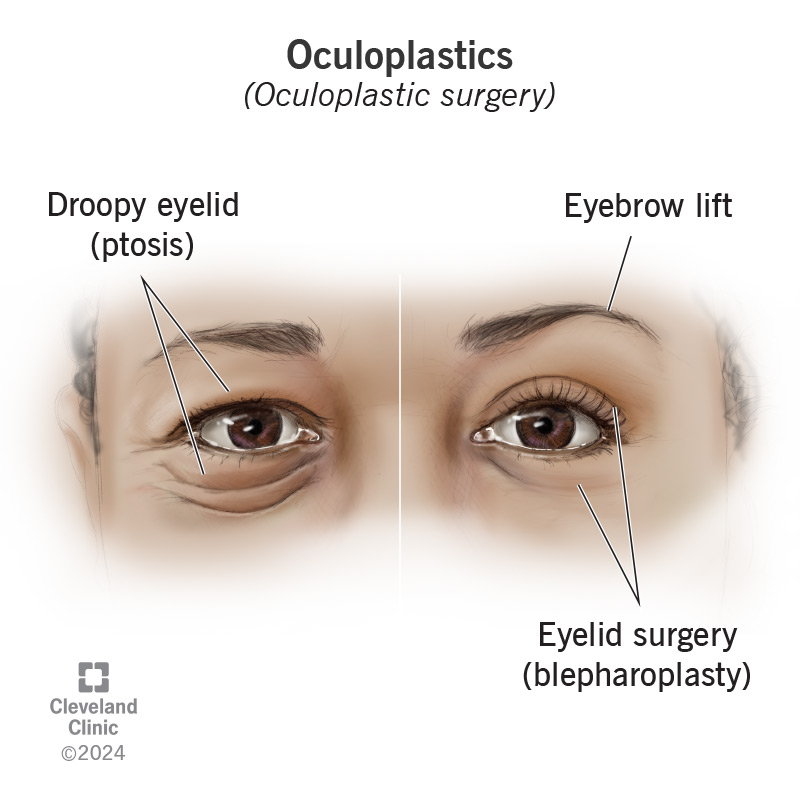Oculoplastics is a field of surgery devoted to the areas of your face around your eyes. It’s a field of surgery that can have a big impact on your life, both because it affects how your eyes work and your appearance. These surgeries can treat and prevent medical issues, repair damage and help you feel better about the way you look.
Advertisement
Cleveland Clinic is a non-profit academic medical center. Advertising on our site helps support our mission. We do not endorse non-Cleveland Clinic products or services. Policy

Image content: This image is available to view online.
View image online (https://my.clevelandclinic.org/-/scassets/images/org/health/articles/oculoplastics-oculoplastic-surgery)
Oculoplastic surgeries, often referred to simply as oculoplastics, are procedures that repair or alter the appearance of parts of your face connected to and immediately around your eyes. These procedures can affect soft tissues like skin, fat and muscle, and the bones of your skull, too.
Advertisement
Cleveland Clinic is a non-profit academic medical center. Advertising on our site helps support our mission. We do not endorse non-Cleveland Clinic products or services. Policy
Oculoplastics can be cosmetic or medical. An important thing to remember is that cosmetic doesn’t mean unimportant or vain. It’s a lot harder to feel comfortable and confident if you don’t like something about your appearance, which is why appearance differences or changes that you don’t like about yourself can negatively affect your mental health and well-being.
And oculoplastic procedures aren’t just for age- or appearance-related concerns. Oculoplastic procedures can repair injury- or disease-related changes. Oculoplastic procedures are very common, partly because so many procedures fall under this umbrella and because there are so many reasons why a person might need one of those procedures. Oculoplastic surgeries can:
The location for these surgeries can vary, too. Some oculoplastic procedures are simple, outpatient surgeries and you can go home the same day. Others may involve a hospital stay while you recover from the surgery itself or because of other related concerns or events.
Advertisement
Oculoplastic procedures can involve any of the following:
Oculoplastic surgeries can treat dozens of conditions and issues. Examples of specific oculoplastic procedures include:
Physicians from a few different specialties can do oculoplastic surgeries. And the specialties involved can depend heavily on how complex the surgery needs to be.
Surgeons who do oculoplastics usually come from the following fields:
Simpler superficial procedures, which only affect your skin and none of the tissues underneath, are often doable by providers like dermatologists or even primary care providers. Examples include removing warts or skin tags, or laser procedures to reduce wrinkles.
The tissues in your face, especially around your eyes, are very sensitive to touch and pain. Anesthesia is part of these surgeries, preventing you from feeling pain during these procedures. General anesthesia, which puts you into a deep sleep so you don’t feel pain, is usually the preferred method. But there are many reasons why local or regional anesthesia, which numb specific areas of your face, would be the best choice for your case.
Advertisement
After surgery, you’ll likely feel some pain or discomfort. But your surgeon will talk to you before your surgery about the plan for pain management after the procedure. It’s common to use prescription medications to help limit your pain while your face heals. Your surgeon may also recommend using over-the-counter (OTC) medications like NSAIDs (nonsteroidal anti-inflammatory drugs) to help manage surgery-related pain and inflammation.
Generally speaking, oculoplastic surgery is safe. But it does come with some unavoidable risks, which are the same with any type of surgery. Those include:
While some risks are unavoidable, healthcare professionals do everything they can to shift the odds in your favor. One way to do that is with a team approach. Surgeons, anesthesiologists, nurses and many other clinicians combine their skill sets and work together. That means they plan and prepare for various risk factors so they can react quickly and expertly, if necessary.
When you look at a person’s face, one of the places you’ll look at first and most often is their eyes. So, it’s only natural to feel concerned about what the areas around your eyes look like, too. It’s important to remember that even when surgeries aren’t happening for strictly medical reasons, that doesn’t mean they’re trivial or vain.
Advertisement
If you have concerns about your face structure or appearance, ask your eye specialist or another healthcare provider about it. They can help you better understand your situation and access additional resources and care. Your providers aren’t there to judge why you pursue surgery. Their job is to give you the best possible care and help you feel better when you face the world.
Advertisement

Sign up for our Health Essentials emails for expert guidance on nutrition, fitness, sleep, skin care and more.
Learn more about the Health Library and our editorial process.
Cleveland Clinic’s health articles are based on evidence-backed information and review by medical professionals to ensure accuracy, reliability and up-to-date clinical standards.
Cleveland Clinic’s health articles are based on evidence-backed information and review by medical professionals to ensure accuracy, reliability and up-to-date clinical standards.
Cleveland Clinic’s ophthalmologists and optometrists have the highest training available. We provide exams, vision correction and care for many eye conditions.
